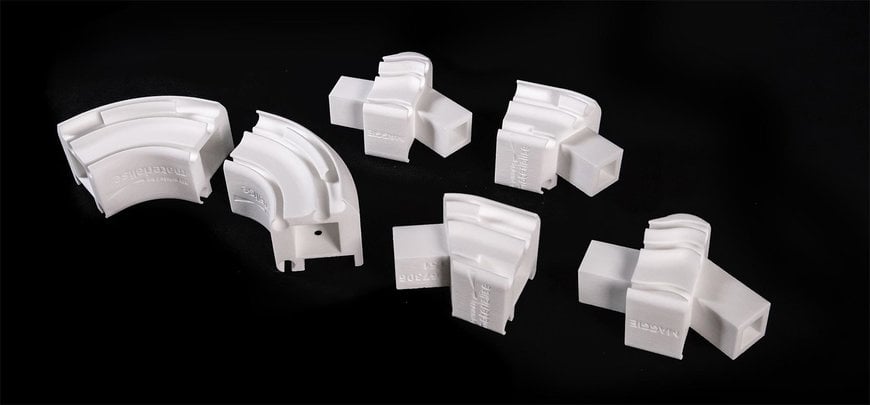www.ptreview.co.uk
02
'21
Written on Modified on
Materialise Introduces 3D Printing Service Using up to 100% Re-used Powder
Bluesint PA 12 Offers More Sustainable Option for 3D Printing.

Materialise (Nasdaq MTLS), a global leader in 3D printing solutions, has introduced a new service for more sustainable 3D printing. The company’s Bluesint PA 12 service makes it possible to 3D print with up to 100 percent re-used powder, significantly reducing powder waste, and offers customers a more sustainable option for 3D printing. Materialise announced the material innovation last year and following a beta program for selected customers the company now makes its Bluesint PA 12 service broadly available.
“3D printing has established itself as a powerful and sustainable manufacturing solution for the production of smaller, customized parts by enabling localized production, but it is vital that our industry continues to invest in new ways to make the 3D printing process itself more sustainable”, said Jurgen Laudus, vice president and general manager of Materialise Manufacturing. “Through innovations like our Bluesint PA 12 service, Materialise empowers its customers to make a choice for sustainability.”
With selective laser sintering, the second most used 3D printing technology*, up to 70 percent of the powder is down-cycled or becomes waste. With Bluesint this waste powder can be given a second life to print new parts, creating a path toward eliminating waste in 3D printing.
Bluesint PA 12 also presents an opportunity to reduce CO2 emissions. The production of each kilogram of standard PA 12 powder generates more than seven kilograms of CO2. By reducing the need for new material production, Bluesint PA 12 enables a decrease of CO2 emissions from powder production of approximately 30 percent. If half of all parts that are printed globally using PA 12 selective laser sintering, were printed using Bluesint PA 12, this would reduce CO2 emissions from 3D printing by more than 2,800 tons per year, the equivalent of an average passenger vehicle driving more than 11 million kilometers (7 million miles).
The availability of Materialise’s Bluesint PA 12 service follows an extensive beta program for selected customers. The Maggie Program, a Belgium-based non-profit organization that builds multi-functional shelters for local communities, participated in the testing program for the production of their shelters.
“We rely on the flexibility of 3D printing to address some of the manufacturing challenges we faced for the production of certain parts of our shelters”, says Benjamin Denef, CEO and Founder of Maggie Program vzw and DMOA architects. “With Bluesint PA 12, Materialise now gives us the possibility to manufacture these parts in a more sustainable way with similar mechanical properties. We are always looking for new ways to reduce our environmental footprint and Bluesint PA 12 allows us to make a manufacturing choice not only based on technical specifications but also on the environmental impact.”
“We expect many of our customers will choose to use the Bluesint PA 12 service for functional prototype printing”, said Jurgen Laudus, vice president and general manager of Materialise Manufacturing. “Typically, 3D printed prototypes have short lifespans because they are only used in the validation phase, creating a need for a more sustainable solution in this part of the product development process. Bluesint PA 12 allows for sustainable development of prototypes with functional and mechanical properties comparable to the end part.”
More information, including photos and an infographic on how Bluesint PA 12 reduces the carbon footprint of 3D printing, is available here.
www.materialise.com

